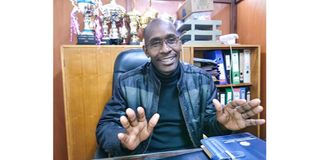How cleric is sensitising men to gender equality

Mr Fanuel Demesi, a pastor at Friends International Centre Church, during the interview on June 2, 2022, at his office on Ngong Road, Nairobi County.
What you need to know:
- Realising change entails sensitising men and women to ways of ending inequalities at home, market, workplace and leadership, among other facets of life.
- In an interview with Mr Fanuel Demesi, a pastor at Friends International Centre Church, we seek to establish his contribution, impact and challenges in this noble duty.
As part of the drive to attain gender equality, the church is considered an avenue for influencing change in the communities. This change would come by sensitising men and women to ways of ending inequalities at home, market, workplace and leadership, among other facets of life. In an interview with Mr Fanuel Demesi, a pastor at Friends International Centre Church, we seek to establish his contribution, impact and challenges as he pursues this noble duty of educating men on gender equality.
What drove you into men mentorship?
I had not purposed to mentor men. I was doing my pastoral work when I encountered Fred Nyagah (Fredrick Nyagah, the national founder and chairperson of Men Engage Kenya Network). He took me through a week-long men engagement training and after sometime, I realised there was something I could do for men. It was like a passion passed down to me.
What did you learn when you started mentoring men?
I was trained in 2017, and by 2018, I had begun engaging them. Men have been socialised into certain attitudes and behaviours, which, in the long run, hurt them. And unless they are transformed, the people around them will suffer.
What do you train them in?
I train men in equal gender power relations, sexuality, drug and substance abuse. We also talk about men’s health, healthy and unhealthy relationships, as well as ending gender-based violence.
Do you have a men- or boy-tailored programme?
I don’t have a special programme, but I take advantage of my platform to speak with them. In my sermons, I integrate messages that directly target them. I also do music training in schools. When I go to a boys’ school, I usually take at least 10 minutes to mentor them. But I intend to have one for boys who have just finished school. They will be transformed men if they are helped to develop the right attitude as they transit to adulthood.
How has your work been received by men and boys?
Some would scold me saying I have been brainwashed with the Beijing gender equality narrative [In the 1995 Fourth World Conference on Women held in Beijing, China, countries committed to promoting women’s empowerment]. Others claim I am henpecked. I don’t blame them because their claims are merely a reflection of their attitudes. And changing attitudes takes quite some time. There are cases where women rejoice that ‘yes, pastor told them.’ It spans out to be a war between men and women—which should not be the case. Women need men’s support to succeed. And men need women to succeed.
How often do men seek your guidance?
Quite frequently. Most of the time, they are the men who are just about to get married or men who have been married for five to 10 years.
What issues trouble them?
Those preparing for marriage are concerned about how to get a suitable partner, while others will be dealing with break-ups. It is during these counselling sessions that I seek to influence change in their attitudes. I ask them what they think about unequal gender power relations.
For those in marriage, the issue is unrealistic expectations about provision. The women expect the men to provide everything for them. They wonder why the wife would want him to meet all her expenses, yet she is working. They feel overwhelmed providing for the family.
There is also unrealistic expectation on intimacy that makes wives consider men less of husbands. This stresses men a lot. As a result, they resort to violence to prove to the wives that they are man enough.
What steps have you taken in making women understand this?
I intend to launch an initiative for women. I would sensitise them to issues troubling men and also allow them to air their concerns. At the end of the day, we will have solutions that work for the benefit of men and women.
I have, however, before found it difficult to have a women-only group. Society seems to have a bad perception of pastors and women congregants. If you meet an all-women group, a section of the church will ask “what is he telling them?” Society is so broken that Fanuel cannot call women to share with them insightful tips about life. To them, it is a gesture that I am interested in them, yet my sole intention is to offer guidance.
In 2019, I tried to start one and put a woman congregant in charge. She ended up telling them that they cannot open up to a man, lest I start taking advantage of them. One by one, they left and that is how the group was dismantled.
To what extent is the community or family a barrier to men’s empowerment?
We have enlightened some men to share unpaid and domestic work and they were transformed. At home, however, the environment is unwelcoming. The man says he wants to cook for the family, but the woman is worried that something has changed about him. They don’t want them to cook. But I understand where they are coming from. They fear society will brand them bad domineering wives.
So what is the solution to this divide?
Society and women have to be transformed to be ready for transformed men. This, therefore, means having sensitisation drives that target both spouses and all members of the community.





